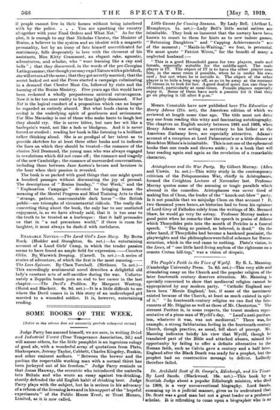Aristophanes and the War Party, By Gilbert Murray. (Allen and
Unwin. Is. net.)—This witty study in the contemporary criticism of the Peloponnesian War, chiefly in Aristophanes, formed the Creighton Lecture of November last. Professor Murray quotes some of the amusing or tragic parallels which abound in the comedies. Aristophanes was never tired of makinefun of Cleon, the leader of the " knock-out-blow " party. Is it not possible that we misjudge Cleon on that account ?
two thousand years hence, an historian had to form his opinions of Lord Grey of Fallodon solely from the writings of Mr. Bernard Shaw, he would go very far astray. Professor Murray makes a good point when he remarks that the speech in praise of Athens which Thuoydides puts into the mouth of Pericles is a funeral speech. "The thing so praised, so beloved, is dead." On the other hand, if Thucydides had become a hardened pessimist, the playwrights and the philosopherswerefull of schemes for Recon- struction, which in the end came to nothing. Plato's vision, in the Laws, of " one little hard-living asylum of the righteous on a remote Cretan hill-top," was a vision of despair.


































 Previous page
Previous page